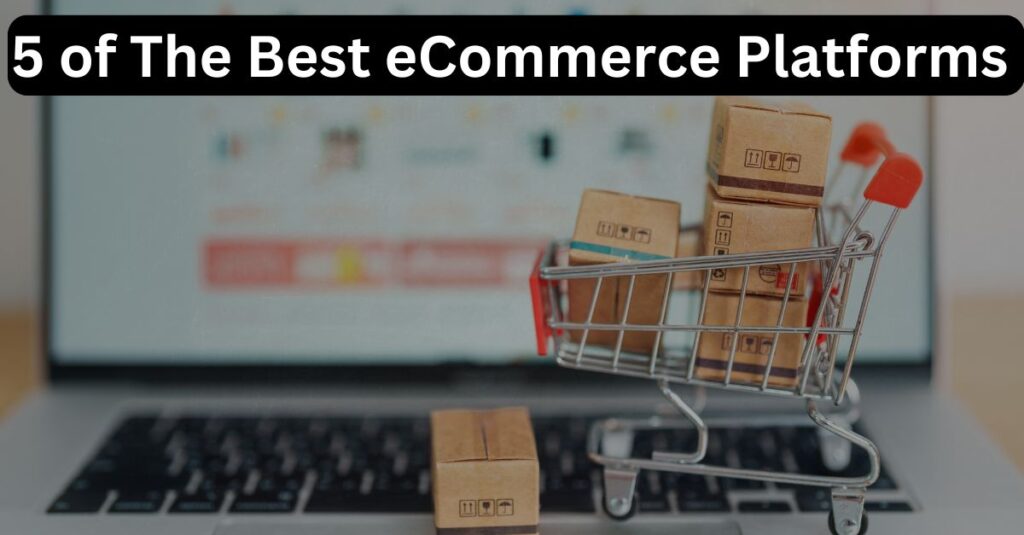
In today’s digital world, setting up an online store has never been easier. Businesses are now moving online to reach more customers and boost their sales. But here’s the big question: which eCommerce platform is best in 5 of the best ecommerce platforms should you choose? With so many options out there, picking the right one for your needs can be overwhelming. Don’t worry—we’re here to help! In this article, we’ll explore 5 of the best eCommerce platforms and explain how they can help you build a successful online store.
- 1. Shopify: The Ultimate All-in-One Solution
- 2. Wix: The Easy Drag-and-Drop Builder
- 3. BigCommerce: Perfect for Growing Businesses
- 4. WooCommerce: The Flexible WordPress Plugin
- 5. Weebly: Affordable and Easy to Use
- Conclusion
-
FAQ
- Which is the best eCommerce platform?
- What are the 5 types of e-commerce?
- What is the best selling platform?
- Which platform is best for sales?
- Who are the top 5 US e-commerce companies?
- Can I switch eCommerce platforms later?
- What’s the difference between Shopify and WooCommerce?
- Which platform is best for selling on social media?
- Do I need coding skills to use these eCommerce platforms?
- Which platform is best for a growing business?
- What payment gateways do these platforms support?
1. Shopify: The Ultimate All-in-One Solution
According to my opinion in 5 of the best eCommerce platforms shopify is on #1. Imagine this: you’ve got a brilliant product idea, and you’re ready to sell it to the world. But where do you start? For many business owners, the answer is Shopify. Why? Because it’s one of the most user-friendly and feature-rich eCommerce platforms out there.
Why Choose Shopify?
Shopify is designed to make selling online simple and fun. It’s a self-hosted platform, which means Shopify takes care of all the technical stuff—like hosting and security—so you can focus on running your business. Here are some of its standout features:
- Sell everywhere: You can sell products on your website, social media (like Facebook and Instagram), and even in-person with Shopify POS.
- Abandoned cart recovery: Ever had customers add items to their cart but leave without buying? Shopify helps you send them reminders to complete their purchase.
- Customizable store design: Choose from hundreds of templates and customize your store with your brand’s logo, colors, and fonts.
- Integrated payment gateways: Shopify works with over 100 payment gateways, including Shopify Payments and Google Pay.
Shopify Anecdote
Take Sarah, for example. She runs a small handmade jewelry business and decided to launch her online store using Shopify. Within a few months, Sarah’s business was booming! Shopify’s tools made it easy for her to manage inventory, create discount codes, and connect with customers on Instagram.
Pro Tip: Start with Shopify’s basic plan for $34/month to get your store up and running quickly.

2. Wix: The Easy Drag-and-Drop Builder
Second # of 5 of the Best eCommerce Platforms. Suppose If you’re new to building websites, Wix might be the perfect choice for you. It’s a versatile website builder with powerful eCommerce features. Wix is known for its drag-and-drop interface, which lets you design your store exactly how you want—no coding skills required.
Why Choose Wix?
Wix is a fantastic option for small businesses or solo entrepreneurs. Here’s what makes it stand out:
- Mobile-friendly designs: Your store will look great on phones, tablets, and computers.
- Apps for extra functionality: Add features like lead capture forms, product videos, and discount codes with apps like Wix Shttps://wordcounter.net/tores and Ecwid.
- Secure shopping: Wix offers SSL certificates to keep your customers’ data safe.
Wix Anecdote
Let’s talk about Mike, who owns a coffee shop. Mike used Wix to build his online store, where he now sells coffee beans, mugs, and brewing equipment. He loved how easy it was to add product images and create a checkout page. With Wix’s built-in tools, Mike’s website now gets hundreds of visitors every week!
Pro Tip: Upgrade to Wix’s eCommerce plan for just $27/month to unlock all the selling features.

3. BigCommerce: Perfect for Growing Businesses
Are you running a growing business with big ambitions? Bigcommerce performed at 3rd number in 5 of the Best eCommerce Plateforms Then BigCommerce might be the best platform for you. It’s a hosted eCommerce platform that provides advanced features for managing large-scale online stores.
Why Choose BigCommerce?
BigCommerce is built for scalability, making it a favorite among fast-growing brands. Here are some of its key features:
- Flexible shipping options: Offer real-time shipping quotes and rate calculators.
- Multichannel selling: Sell on Amazon, eBay, Facebook, and more.
- Customer reviews: Build trust with product reviews and ratings.
- Marketing tools: Use email campaigns and SEO features to boost your sales.
BigCommerce Anecdote
Picture this: Lisa runs a clothing brand and needed a platform that could handle thousands of products. With BigCommerce, she set up her store, synced it with Amazon, and started offering live shipping rates. Now, Lisa’s business is thriving, and she’s reaching customers all over the world!
Pro Tip: Start with BigCommerce’s standard plan for $29.95/month to enjoy powerful tools for your growing business.

4. WooCommerce: The Flexible WordPress Plugin
If your website is already built on WordPress, adding an online store is as simple as installing WooCommerce. This free plugin turns your WordPress site into a fully functional eCommerce store.
Why Choose WooCommerce?
WooCommerce is ideal for tech-savvy users who want full control over their store. Here’s why it’s a great option:
- Customizable: Add plugins and extensions to enhance your store’s functionality.
- Payment options: WooCommerce supports a variety of payment gateways, including PayPal and Stripe.
- Mobile app: Manage orders, add products, and check analytics on the go.
WooCommerce Anecdote
Meet Tom, a photographer who sells prints online. Tom already had a WordPress site, so he added WooCommerce to start selling his art. He loves how easy it is to customize his store and manage orders through the WooCommerce app.
Pro Tip: Check out WooCommerce’s official website for free extensions to get started.
5. Weebly: Affordable and Easy to Use
For those on a tight budget, Weebly is a fantastic option. It’s an eCommerce platform that offers excellent value for money, especially for small businesses.
Why Choose Weebly?
Weebly is simple yet powerful. Here’s why it’s worth considering:
- Affordable plans: Choose from four pricing tiers, including a free option.
- Built-in tools: Manage inventory, print shipping labels, and recover abandoned carts.
- Mobile app: Keep track of your store anytime, anywhere.
Weebly Anecdote
Take Anna, for example. She started a small skincare brand and wanted an affordable way to sell her products online. With Weebly, Anna set up her store, added a blog, and started engaging with her customers through email marketing. Now, she’s building a loyal customer base!
Pro Tip: Explore Weebly’s pricing plans to find the best fit for your budget.
Conclusion
Choosing the best eCommerce platform for your business depends on your needs, goals, and budget. Whether you want an all-in-one solution like Shopify, a flexible plugin like WooCommerce, or an affordable option like Weebly, there’s a platform out there for you.
Before making your decision, consider these steps:
- Identify your business goals.
- Make a list of the features you need (e.g., SEO tools, payment gateways, shipping options).
- Compare pricing plans to find the best value for money.
selecting the right platform, you can build an online store that not only looks amazing but also helps you achieve your business dreams. Ready to get started? Explore these platforms today and take the mere success!
FAQ
Which is the best eCommerce platform?
Shopify for getting up and running quickly.
Square for selling in-person and online.
Ecwid by Lightspeed for starting with a free plan—then growing.
BigCommerce for large-volume sellers.
WooCommerce for adding a shopping cart to an existing WordPress site.
What are the 5 types of e-commerce?
1 Business-to-business (B2B)
2 Business-to-consumer (B2C)
3 Consumer-to-business (C2B)
4 Consumer to consumer (C2C)
5 Business to administration (B2A)
6 Consumer-to-administration (C2A)
7 See also.
8 References.
What is the best selling platform?
Best Selling Platforms: Online Marketplaces
Amazon. Being an eCommerce dominant and one of the best selling platforms, Amazon provides space for more than 9.7 million sellers and 310 million buyers in 2023. ...
eBay. ...
Etsy. ...
TikTok Shop. ...
Reverb. ...
6. Facebook Marketplace. ...
Google Shopping. ...
Walmart.
Which platform is best for sales?
Bonanza.
Ruby Lane.
Etsy.
Chairish.
Swappa.
Poshmark.
Decluttr.
Amazon.
Who are the top 5 US e-commerce companies?
Amazon is the largest online marketplace in the U.S. in terms of monthly organic traffic, followed by Apple, Etsy, Walmart, and eBay.
Can I switch eCommerce platforms later?
Yes, but migrating to a new eCommerce platform can be challenging, especially if you have a large store with many products and customer data. It’s best to choose a scalable platform from the start to avoid major transitions later.
What’s the difference between Shopify and WooCommerce?
Shopify is a fully hosted, all-in-one platform, meaning it handles everything from hosting to security.
WooCommerce is a free WordPress plugin that requires separate web hosting and more customization but offers greater flexibility.
Which platform is best for selling on social media?
Both Shopify and BigCommerce offer seamless integrations with Facebook, Instagram, and TikTok, allowing you to sell products directly on social media.
Do I need coding skills to use these eCommerce platforms?
Not at all! Platforms like Shopify, Wix, and Weebly provide drag-and-drop website builders that make it easy to create and customize your store without coding.
Which platform is best for a growing business?
If you're planning to scale your business, BigCommerce is a great choice because it offers advanced marketing tools, multichannel selling, and unlimited bandwidth to handle large traffic and product listings.
What payment gateways do these platforms support?
Most eCommerce platforms support popular payment gateways like PayPal, Stripe, Google Pay, and Apple Pay. Shopify also has its own payment system called Shopify Payments with lower transaction fees.
